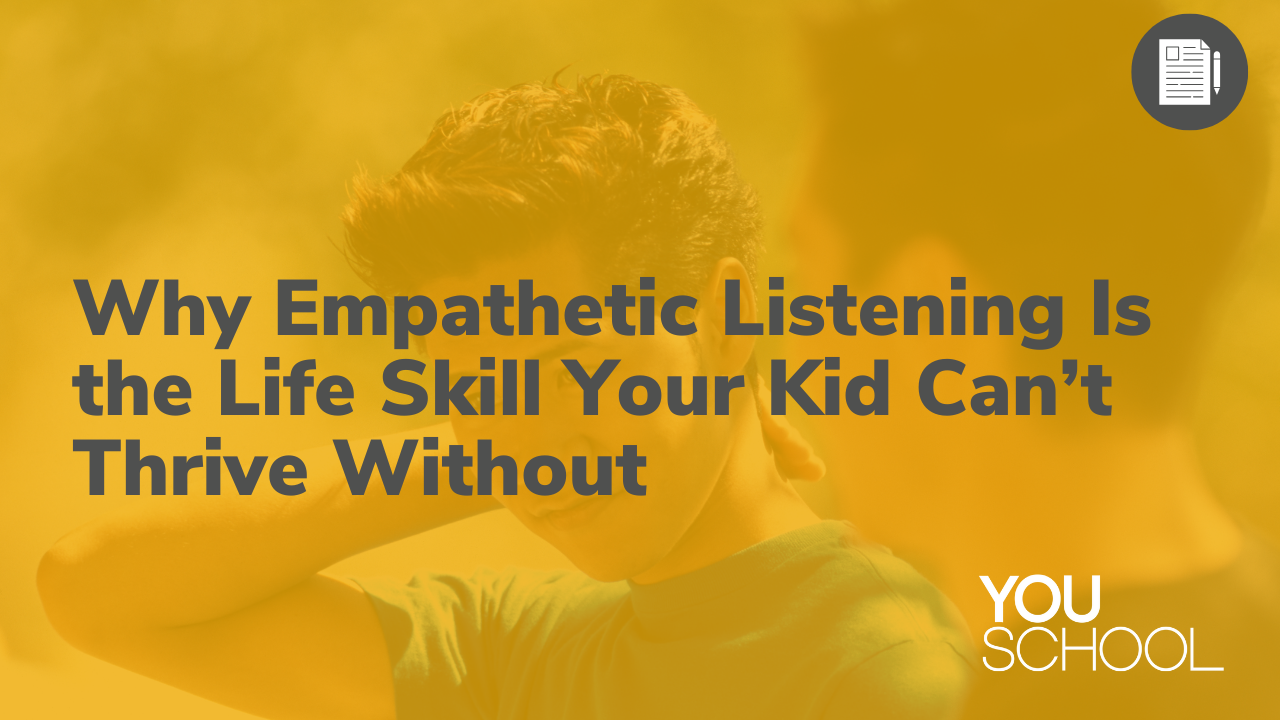Why Empathetic Listening Is the Life Skill Your Kid Can’t Thrive Without

Strong friendships aren’t built on popularity or personality. They’re built on presence—on knowing how to show up when someone else is hurting, struggling, or just needs to feel seen.
And yet, most kids today haven’t been taught one of the most foundational skills of healthy relationships:
Empathetic listening.
Asking your kid the question—“How do you care for your friends?”—can open the door to one of the most important character traits they’ll need for a thriving life. But don’t assume they already know how. Listening with empathy is not instinctive. It’s a learned skill. And too often, it’s never taught.
Why Empathetic Listening Matters So Much
Research in adolescent development and emotional intelligence shows that empathy is tied to everything from relationship quality to leadership ability to long-term mental health.
According to Self-Determination Theory, one of the three core psychological needs for healthy development is relatedness—feeling connected and understood by others. But here’s the challenge:
Kids today are growing up in a distracted world. They text more than they talk. They scroll more than they sit face-to-face. And when someone is hurting, they’re often unsure what to do.
That’s why learning how to really care for a friend—by listening well—is essential. When a kid can offer that kind of presence, they become the kind of person others trust, turn to, and remember.
What Happens If They Don’t Learn It
The stakes are high when kids don’t develop this skill:
-
Friendships stay shallow.
-
Conflict goes unresolved.
-
Emotional support feels awkward or absent.
-
Kids withdraw or offer bad advice because they don’t know what else to do.
And it doesn’t just stop in childhood. Adults who never learned how to listen empathetically often struggle in marriage, parenting, teamwork, and leadership. They may be well-liked—but rarely deeply trusted.
Empathetic listening is one of the quiet skills that sets the stage for lifelong connection.
What Empathetic Listening Looks Like
So, what exactly does empathetic listening look like?
It’s not complicated—but it does require intentionality:
-
Full attention: Putting down the phone, turning off distractions, making eye contact.
-
Reflective statements: Saying things like, “That sounds really hard,” or “You seem frustrated.”
-
No rushing to fix: Resisting the urge to give advice unless it’s asked for.
-
Emotional validation: Letting them know it’s okay to feel what they’re feeling—without judgment.
These small, simple behaviors help a person feel safe, seen, and understood. And for kids, learning this skill can be the difference between fragile and lasting friendships.
How Parents Can Teach Empathetic Listening
Here’s the good news: You can start teaching this today. And you don’t need a workbook or a degree in psychology to do it.
Try these four steps:
1. Talk about it.
Ask your kid:
“What do you do when a friend is upset?”
“What do you think someone needs when they’re having a hard day?”
Let them process it out loud.
2. Practice at home.
Take 10 minutes to sit together and say, “Tell me something about your day—and I’ll just listen.” No fixing. Just presence.
3. Model it.
Let your kid see you listen empathetically to others—your partner, a friend, or even to them. How you respond to their emotions teaches them how to respond to others’.
4. Praise the effort.
When you see them check in on a friend or listen well, call it out:
“That was kind of you to sit with her when she was upset. That’s what good friends do.”
Bottom Line
If you want your kid to be emotionally healthy, relationally strong, and deeply grounded in their friendships, teach them how to care for others—by listening with empathy.
So this week, start here:
Ask your kid, “How do you care for your friends?”
Then help them practice the skill that might just shape every relationship they’ll ever have.
